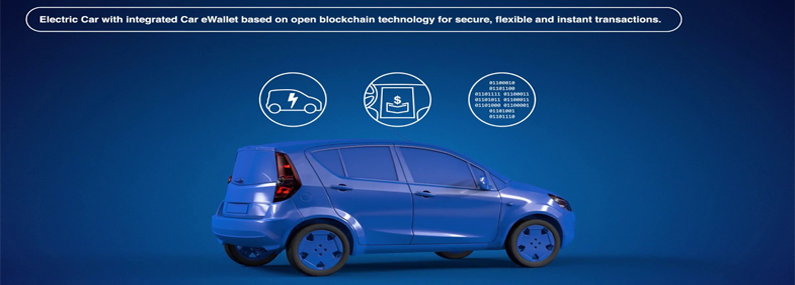ZF, UBS and IBM (NYSE: IBM) will soon be jointly developing an open automotive transaction platform for mobility services based on blockchain technology.
Car eWallet has the potential to radically change the way manufacturers, suppliers and service providers process digital transactions and considerably simplify the use of vehicle services.
Car eWallet is an innovative, digital assistant in the car that allows secure and convenient payments even on the go. Moreover, it can also perform other tasks, like opening the trunk or doors. The Car eWallet is based on the IBM Blockchain technology, which makes it possible to synchronize the information of each participant in the network in a reliable and unchangeable data record. At the same time, it ensures that users only have access to the information that they are permitted to see and use.
This makes secure transactions almost in real time possible without needing a central instance or a reliable third party. The open automotive transaction platform for mobility-related services has the potential to radically change e-commerce between manufacturers, suppliers, service providers and customers.
More convenience and reliability for car sharing
“The trend toward car-sharing and future autonomous vehicles requires, now more than ever, a transaction ecosystem that everyone can use,” explains Dr. Stefan Sommer, CEO of ZF Friedrichshafen AG. “The Car eWallet technology will reduce risks and costs while dramatically improving convenience for owners and users.”
Blockchain technology redefines transactions
The platform is built on IBM Blockchain technology, which is provided through the IBM Cloud and driven by Hyperledger Fabric 1.0, a blockchain framework and one of the Hyperledger projects hosted by the Linux Foundation. With this public cloud service platform the partners intend to build a secure blockchain network that can collect fees for parking, toll, as well as future use cases such as car-sharing, energy provisioning to the power system or delivery services.
“The world of mobility is quickly evolving with self-driving vehicles, electric cars and new mobility services having quickly evolved from visionary concepts into reality. Time of great change requires transformational solutions,” said Dirk Wollschlaeger, General Manager IBM Global Automotive, Aerospace and Defense.“Together with UBS and ZF, we are engineering a new mobility platform to redefine how, when and where traditional transactions occur.”
Veronica Lange, Head of Innovation at UBS adds: “In today's digitally connected world, no single institution works in isolation. As a leading financial services institution we pursue the development of a new platform that will transform how transactions and payments between vehicles and other machines can be done efficiently and safely.”
About ZF
ZF is a global leader in driveline and chassis technology as well as active and passive safety technology. The company has a global workforce of around 137,000 with approximately 230 locations in some 40 countries. In 2016, ZF achieved sales of €35.2 billion. ZF annually invests about six percent of its sales in research & development – ensuring continued success through the design and engineering of innovative technologies. ZF is one of the largest automotive suppliers worldwide.
ZF allows vehicles to see, think and act. With its technologies, the company is striving for Vision Zero – a world of mobility without accidents and emissions. With its broad portfolio, ZF is advancing mobility and services in the automobile, truck and industrial technology sectors.
For further press information and photos, please visit www.zf.com.
For more information about IBM Blockchain, visit https://www.ibm.com/blockchain/.
About UBS
UBS provides financial advice and solutions to wealthy, institutional and corporate clients worldwide, as well as private clients in Switzerland. The operational structure of the Group is comprised of our Corporate Center and five business divisions: Wealth Management, Wealth Management Americas, Personal & Corporate Banking, Asset Management and the Investment Bank. UBS's strategy builds on the strengths of all of its businesses and focuses its efforts on areas in which it excels, while seeking to capitalize on the compelling growth prospects in the businesses and regions in which it operates, in order to generate attractive and sustainable returns for its shareholders. All of its businesses are capital-efficient and benefit from a strong competitive position in their targeted markets.












 Business users want new applications now. Market and regulatory pressures require faster application updates and delivery into production. Your IBM i developers may be approaching retirement, and you see no sure way to fill their positions with experienced developers. In addition, you may be caught between maintaining your existing applications and the uncertainty of moving to something new.
Business users want new applications now. Market and regulatory pressures require faster application updates and delivery into production. Your IBM i developers may be approaching retirement, and you see no sure way to fill their positions with experienced developers. In addition, you may be caught between maintaining your existing applications and the uncertainty of moving to something new. IT managers hoping to find new IBM i talent are discovering that the pool of experienced RPG programmers and operators or administrators with intimate knowledge of the operating system and the applications that run on it is small. This begs the question: How will you manage the platform that supports such a big part of your business? This guide offers strategies and software suggestions to help you plan IT staffing and resources and smooth the transition after your AS/400 talent retires. Read on to learn:
IT managers hoping to find new IBM i talent are discovering that the pool of experienced RPG programmers and operators or administrators with intimate knowledge of the operating system and the applications that run on it is small. This begs the question: How will you manage the platform that supports such a big part of your business? This guide offers strategies and software suggestions to help you plan IT staffing and resources and smooth the transition after your AS/400 talent retires. Read on to learn:
LATEST COMMENTS
MC Press Online